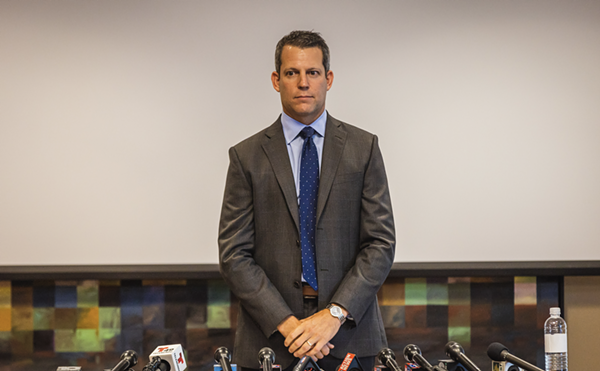It was my first time in prison. I was visiting an old friend, a convicted sex offender.
The prison was isolated in a part of west Texas with more oil rigs on the horizon than homes, and more wrecked cars stacked in salvage yards than registered vehicles. The prison reflected the terrain. Walls the color of sand. Fenced space devoid of life.
In the visitor’s center, men in loose khaki uniforms sat scattered about the rows of chairs, alongside civilians dressed in their Sunday best. A father bounced a child on his knee. Couples flirted over sodas like they were swigging beer at their favorite dive. An older woman helped her husband, whose fingers shook with Parkinson’s disease, button a flannel coat over his khaki uniform. More than the prisons we see on TV, the place resembled a nursing home: a catacomb of decaying life.
When he stepped into the room, Slim flashed the same smile that always made women say he resembles Nicolas Cage. (In his letters, he instructed me to only refer to him as Slim, though he never explained why.) He had a shaved head and a sturdier frame than I remembered. In a way, prison had been good to him. The last time I saw Slim was four years before in Las Vegas, where he was eking out a living as a gambler and a PA on film projects.
Slim was much more versed at sitting and talking for hours than I. He started off by explaining what most visitors wanted to know: what prison was really like. He described the minimum-security facility as tame. As an SO (sex offender) he had only been in a few minor brawls, usually over his right to occupy places like the TV room or weight room, which other inmates deemed off-limits to SOs. He compared prison society to schoolyard politics, though this schoolyard was filled with uneducated, violent and mentally unstable boys in men’s bodies, with no women around to defuse their hormones.
Slim made a point of saying that he didn’t associate with the Kidmos (child molesters), whom he described as Dungeons & Dragons nerds. Recently an older Kidmo was held down in his sleep and nearly beaten to death after some inmates discovered that he had pasted photos of young people in a handwritten book of erotic stories. The vigilantes who administered this punishment couldn’t help bragging about their exploits, for which they earned a few additional years on their sentences.
Prison life was tolerable. Slim had access to musical instruments, mp3 players, TVs, books, magazines, weights. In some ways, incarceration seemed like a vacation. With all his practical concerns accounted for, he was free to concentrate on his passions and hobbies. He read epic books, practiced the guitar, and was taking business courses. He knew more about professional sports teams than most TV broadcasters. During our visit he kept checking the TV in the corner. He had a bet — involving some saltwater taffy — riding on the game. The inmates were ingenious. They found ways to make all kinds of things (pizza, cake) and to smuggle in drugs — which actually did involve someone’s asshole.
Slim opened up about the particulars of his arrest. He’d had plenty of time to polish the story of his innocence. He was very convincing. He claimed his only real crime was being a bit too undiscriminating with whom he flirted with online. He was busted for meeting a 16-year-old for lunch, though he repeatedly told her via text that nothing physical could happen between them. The police went through his texts and his computer, and found other women he had flirted with. He detailed a story of crooked cops, trumped-up charges, and terrible lawyers. Ultimately, he was charged with five counts of sex crimes, none of which involved physical contact. His legal counsel told him that individually, each case would have been dismissed, but collectively they suggested a pattern. His lawyer convinced him to take the plea because if he lost two of the counts, he would be sentenced to life. As it stood, he would be in prison for the better part of a decade, and he would be a registered sex offender for the rest of his life.
I just nodded. I was not there to judge the truthfulness of his story. He had already been judged enough.
In the end, Slim said he was not guilty of any of the crimes he was charged with, but he did admit that he’d been in a bad place in Vegas. He was addicted to unprotected sex with women he met online. He used people and took those close to him for granted. If nothing else, prison made him value those close to him and his time with them.
Slim’s conviction had not changed his core personality, with the exception of making him a bit more cynical — he was convinced prison was just a scam to enlist slave labor. With the optimism of a professional gambler, he laid out grand plans for his release, another subject he’d obviously spent much time considering. He will settle down with a bisexual fashion model and start a family. He will start his own business after he builds some capital gambling; he had been perfecting his poker skills by reading strategy books and playing with inmates. He also planned to have multiple books and screenplays ready to shop around. I kept telling him to write a comic memoir about the absurd realities of prison — something along the lines of I Love You Phillip Morris. He said he would, later, but he wanted to fictionalize it and turn it into a political piece that exposed the system’s flaws.
The future did not worry him. Only the present. As a writer, I was struggling to pay bills. I’d just finished a book that was rejected by more than 100 literary agents and I had no idea what to do next with my career. Slim did not have such concerns. He assumed he would have no trouble getting a sizable advance on his first novel, the first draft of which he had been talking about finishing for more than a year. I just smiled and nodded.
When visiting hours came to an end, we were escorted into two separate lines. The men in his line were led through a door where they would be stripped naked and forced to spread their ass cheeks for inspection. The people in my line were led outside, where we jumped in our cars and waited in line to file out of the parking lot in pursuit of the nearest fast food franchise. It felt like a funeral procession — as though I had just been to Slim’s wake. I felt sad for him. I also felt fortunate to be on this side of the wire, to have the freedom to be a failure.
I could probably talk for just as long about how SOs are the whipping boys of the criminal justice system as Slim could spend explaining the nuances of his innocence — how his “crimes” are not even illegal in other modern countries, how many of the “great men” of history would be sex offenders by today’s standards…
In the end, I believe a society can be judged by how it treats its criminals. Do we view these men as inherently evil, or do we acknowledge that they are products of their environment? I do not presume to know how to fix everything wrong with the criminal justice system, but I do think people should be given a more candid view of inmates and prisons than the two-dimensional depictions we see on TV. Perhaps, instead of being removed to remote locations, prisons should be built in the heart of cities. There, these foreboding structures would serve as warnings, as monuments to our failures as a society, and reminders that the distance separating inmates from civilians is not nearly as great as most of us suspect.


















